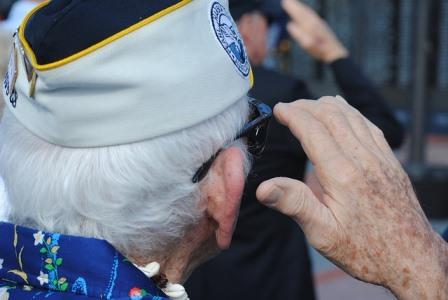- Calls to this hotline are currently being directed to Within Health, Fay or Eating Disorder Solutions
- Representatives are standing by 24/7 to help answer your questions
- All calls are confidential and HIPAA compliant
- There is no obligation or cost to call
- Eating Disorder Hope does not receive any commissions or fees dependent upon which provider you select
- Additional treatment providers are located on our directory or samhsa.gov
Resources for Veterans Who Are Struggling With Eating Disorders

Contributor: Crystal Karges, MS, RDN, IBCLC, Special Projects Coordinator at Eating Disorder Hope/Addiction Hope
Individuals who have served in any branch of the military have likely faced challenges and struggles unknown to many. The demands required of our military members are physical, emotional, mental, and psychological, often permeating far beyond the time served in the military. Many military veterans are faced with the challenge of reintegrating into civilian life while possibly attempting to cope with a mental illness triggered during active duty time.
Facing an Eating Disorder as a Military Veteran
For many service members, the experience of serving in the military may have triggered the development of an eating disorder, such as anorexia nervosa, bulimia nervosa, or binge eating disorder. While there is no one direct factor responsible for these psychiatric illnesses, the demands of the military and stressors that service men and women face can be overwhelming, particularly for an individual who is susceptible to having an eating disorder.
Whether an eating disorder developed during active time in the military or after a military career has ended, resources are needed for treatment and recovery. Many military members who are dealing with an eating disorder may attempt to conceal their struggle during their time in the service, only to find themselves needing help and support once their military has concluded. This can be an added challenge to adapting to civilian life and learning to reintegrate into society.
Connecting With Resources For Help and Treatment
 Every person struggling with an eating disorder deserves help and treatment. Many individuals who face an eating disorder often feel isolated in their struggle, ashamed at what they may be dealing with, or afraid to ask for help. The stigma associated with these diseases also makes it difficult to come forward and admit the need for help.
Every person struggling with an eating disorder deserves help and treatment. Many individuals who face an eating disorder often feel isolated in their struggle, ashamed at what they may be dealing with, or afraid to ask for help. The stigma associated with these diseases also makes it difficult to come forward and admit the need for help.
If you are a military veteran who is struggling with an eating disorder, be sure to talk with someone you trust about what you are facing. The good news is that there are many resources available for recovery. Some treatment centers for eating disorders have specialized programs for military members, which can help address the unique needs that service men and women may be facing in addition to an eating disorder.
Community Discussion – Share your thoughts here!
What do you think are some of the challenges military members might face that increase their susceptibility to developing an eating disorder?
 About the Author: Crystal is a Masters-level Registered Dietitian Nutritionist (RDN) with a specialty focus in eating disorders, maternal/child health and wellness, and intuitive eating. Combining clinical experience with a love of social media and writing, Crystal serves as the Special Projects Coordinator for Eating Disorder Hope/Addiction Hope, where her passion to help others find recovery and healing is integrated into each part of her work.
About the Author: Crystal is a Masters-level Registered Dietitian Nutritionist (RDN) with a specialty focus in eating disorders, maternal/child health and wellness, and intuitive eating. Combining clinical experience with a love of social media and writing, Crystal serves as the Special Projects Coordinator for Eating Disorder Hope/Addiction Hope, where her passion to help others find recovery and healing is integrated into each part of her work.
As a Certified Intuitive Eating Counselor, Crystal has dedicated her career to helping others establish a healthy relationship with food and body through her work with EDH/AH and nutrition private practice.
The opinions and views of our guest contributors are shared to provide a broad perspective of eating disorders. These are not necessarily the views of Eating Disorder Hope, but an effort to offer discussion of various issues by different concerned individuals.
We at Eating Disorder Hope understand that eating disorders result from a combination of environmental and genetic factors. If you or a loved one are suffering from an eating disorder, please know that there is hope for you, and seek immediate professional help.
Last Updated & Reviewed By: Jacquelyn Ekern, MS, LPC on April 18, 2016
Published on EatingDisorderHope.com

The EatingDisorderHope.com editorial team comprises experienced writers, editors, and medical reviewers specializing in eating disorders, treatment, and mental and behavioral health.

